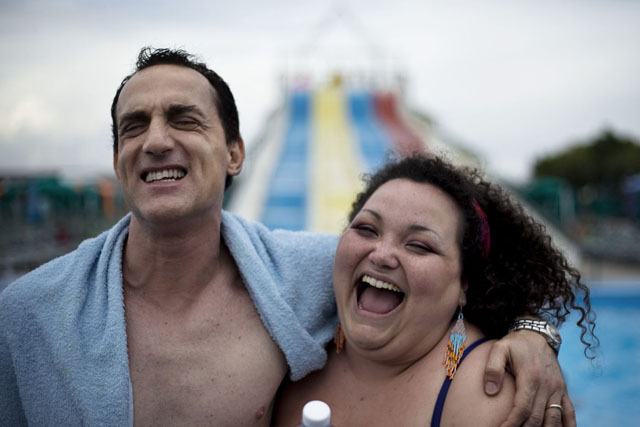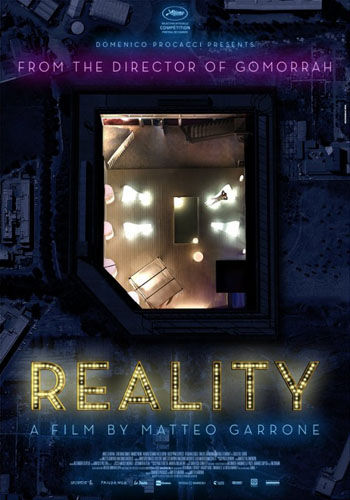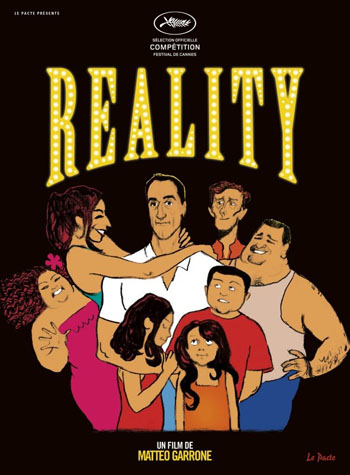“For his latest film, showing in competition in Cannes, Matteo Garrone has brought back a couple of actors from his gut-wrenching true-life mafia drama Gomorrah,” writes the Guardian‘s Peter Bradshaw, “but the tone and feel is very different. This is a boisterous, watchable satire on reality television and real values: in Naples, cheeky fish stall owner and small-time scam artist Luciano (Aniello Arena) becomes obsessed with getting on Big Brother, or Grande Fratello, and translating what he fondly imagines to be his local-hero status into big time wealth and celebrity. It’s a likable film played with gusto and heart—though fundamentally a little sentimental and predictable.”
“Its striking opening sequence,” writes Geoff Andrew for Time Out London, “shot from a helicopter as a horse-drawn golden coach makes its way through the traffic of the suburbs beneath Vesuvius, finally arriving at a wedding of ostentatious opulence and vulgarity—sets everything in place: the preference for long, sinuous sequence shots, the painstaking attention to mood and detail, an impressive, almost epic sense of scale. But it’s that last quality, carried over from Gomorrah, which is at once the film’s strength and its shortcoming. As the narrative focuses increasingly on Luciano…, so the film turns from amusing, faintly absurd satire towards ever ‘bigger’ themes. These are concerned with the destructive role played in modern life by our obsession with celebrity and appearance. In short, the movie becomes a little too long and heavy-handed for the more intimate and immediately plausible aspects of its subject.”
“Reality-TV addiction is overripe for satire, yet the script here swerves from anything biting, opting for an affectionate look at a family and the rabbit hole this father of three jumps into on his mad quest for celebrity,” writes Jay Weissberg in Variety. “Garrone shines only a very dim flashlight on the emptiness of celebrity culture. Perhaps the helmer’s fondness for his characters prevented him from bringing out the knives: There’s nothing to chew on here, no commentary to set auds pondering the way reality skeins have changed perceptions of what’s real. Fourteen years after The Truman Show, viewers—especially the foreign-film crowd—will expect a genuine engagement with the phenomenon rather than gentle ribbing.”
“The director lingers over the the sign of the famed Italian studio Cinecitta as Luciano heads into his audition, as if to share his disbelief that such a fabled ground for some of the country’s greatest cinematic works, could dare play host to such ‘low art,'” writes the Playlist‘s Kevin Jagernauth. “And we watch Big Brother along with Luciano, and yes, it’s pretty empty and vacuous. So?”
“Maybe the film should be read as a metaphor for the decline of Italian cinema itself, surpassed in the popular imagination by trash TV and no longer able to connect with any kind of reality around it,” suggests Deborah Young in the Hollywood Reporter. “There are some interesting hooks here to Fellini’s anti-private television diatribe Ginger and Fred and maybe an echo of Anna Magnani pushing her way through the crowds to audition her daughter in Visconti’s Bellissima. But clearly today’s reality has gone far beyond all that. Nothing in the film hits the same sour note as a few video shots of mindless, carousing figures in bed captured for Big Brother.”
IndieWIRE‘s Eric Kohn thinks better of the film, noting that a “ebullient, Disneyesque soundtrack by the great Alexandre Desplat (Moonrise Kingdom, The Tree of Life) contributes to an illusory sense of uplift that runs counter to the events actually taking place—or how they appear to take place. Reality may, in fact, put an end to the idea of Garrone as a traditional neorealist; his naturalism is intentionally misleading right up until the simultaneously haunting and wondrous finale. Critics were comparing it to Martin Scorsese’s showbiz satire King of Comedy almost immediately after the first screening at Cannes, an apt reference point since both movies deal not with the pratfalls of fame but its impact on those obsessed with achieving it for the wrong reasons.”
Here’s a clip; if I find anything with English subtitles, I’ll update:
More from Ryland Aldrich (Twitch), David Fear (Time Out New York), Allan Hunter (Screen), David Jenkins (Little White Lies), Drew McWeeny (HitFix) and Steven Zeitchik (Los Angeles Times). And a bit of human interest here: Vanity Fair‘s Julie Miller notes that Aniello Arena, who plays Luciano, is currently “serving time in prison. Arena reportedly has been imprisoned for two decades and was excused to star in director Matteo Garrone’s film during the day as long as he returned to custody at night. According to Forbes, Arena is currently serving a 20-year-to-life term in Italy for double murder.”
Update: At Hammer to Nail, Michal Oleszczyk suggests that “the film shares more than its enchanted musical cues with the Spielberg universe: Luciano, as played by the borderline-manic Arena, is close to Richard Dreyfus’s character in Close Encounters of the Third Kind, another movie about sudden conversion to a ‘truth’ greater than an individual. Whereas Spielberg granted his holy sci-fi fool a heavenly ascent into his fantasy world, Garrone does it only to an extent, never mocking Luciano for his silly TV-fueled dreams, but still showing how destructive can they become when treated as an actual Second Life.”
Updates, 5/21: At the AV Club, Mike D’Angelo suggests that “the movie works better conceptually than it does moment-to-moment, as its luckless hero’s journey into delusion does follow a predictable trajectory (albeit one enlivened by Arena’s winning performance). But it’s still invigorating to see a movie unafraid to make a bold statement, though few seem to have noticed. If Luis Buñuel were alive today, this is roughly what I’d expect him to be up to.”
“Garrone feels deeply for Luciano’s taxing plight, but never lets him escape the mire of his actions,” writes Glenn Heath Jr. at Press Play. “His self-imposed encasement inside the container of ‘reality television’ is a reflection of personal retreat, not an assessment of society’s many contradictions and failures. In Reality, giving up on ourselves (and each other) is the real tragedy, the true epidemic of character, devoid of a happy ending, real or imagined.”
Entertainment Weekly‘s Owen Glieberman: “Reality sputters somewhat in its second half; it could have used weirder and wilder twists. Yet I was held by Garrone’s nearly religious vision of the place that reality TV has come to occupy. In an American satire, a character like Luciano would be mocked, however affectionately, for the pettiness of his fame-whore dreams. But Garrone, coming from the Catholic culture of Italy, is much more metaphysical about what reality TV represents. We see bits and pieces of the Italian Big Brother on television, with slinky models and gigolos lounging around on couches and in bed, doing next to nothing. The show makes Jersey Shore look like a play by Eugene O’Neill, yet it’s Garrone’s audacious conceit that Luciano doesn’t just want to join this Andy Warhol dead zone for the purposes of wealth or celebrity. He wants to cross over to The Other Side, to a place more real than reality. It is, in every sense, the Afterlife.”
“Reality could be thought of as a fictional counterpart to Videocracy, Erik Gandini‘s impressionistic 2009 documentary tracing the toxic side effects of the media monopoly held by prime minister Silvio Berlusconi, who became the most powerful man in the land by building an empire based largely on exploitative game shows.” The LA Weekly‘s Karina Longworth explains.
To Jake Howell, writing at Movie City News, “Reality feels like the spiritual successor to (and a modernization of) Luchino Visconti‘s 1951 Neorealist classic Bellissima.” At the House Next Door, Budd Wilkins finds that Reality “abounds in moments of darkly ironic humor.” The Telegraph‘s Robbie Collin gives it four out of five stars. Camillo De Marco interviews Garrone for Cineuropa.
Update, 5/26: Oscilloscope Laboratories, co-founded by the late Adam Yauch, has picked up US rights, reports indieWIRE‘s Peter Knegt.
Update, 5/27: Reality‘s won the Grand Prix.
Update, 5/29: “Reality provides a reading of TV that’s ingeniously Italian and Catholic.” Robert Koehler explains at the Film Society of Lincoln Center.
Cannes 2012 Index: a guide to the coverage of the coverage. For news and tips throughout the day every day, follow @KeyframeDaily on Twitter and/or the RSS feed. Get Keyframe Daily in your inbox by signing in at fandor.com/daily.






